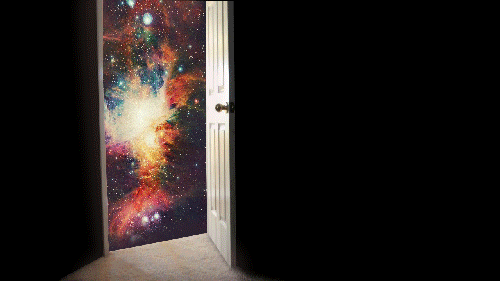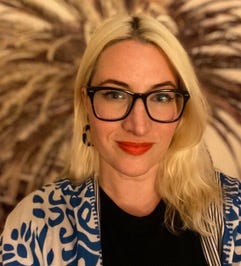Welcome to The Audio Storyteller: tips and tricks for audio producers. Subscribe to get the full list of jobs and training straight to your inbox 💌
Hello audio storytellers,
I hope you were able to carve out some time for rest, listening and creativity during the holidays. It’s lovely to be back in your inboxes.
Everyone takes a different path into this industry, whether it’s a post-college internship then working your way up, or transitioning from a completely different career. I think we can all agree that whatever route you’re on, it’s not easy.
It takes nerve, doggedness and a fair amount of late-night DAW frustration. Producer Erin McGregor knows a thing or two about all of those. Erin oversees community, membership and mentorship at AIR (the association of independents in radio). Here she gives us some frank advice on breaking into the audio industry, self-worth, keeping the faith – and how to use AIR’s resources at any career stage.
What was your path into audio?
The story starts 12 years ago when I came to the States. I was cleaning houses and nannying, and I would listen to This American Life or Radiolab. I would find myself standing still, holding a broom, crying. I was like: “This is how I want to connect with the world, this is the way that I can make a difference.” These stories really touch me, they stick to my bones. Radio had a very visceral effect on me.
I got this idea to make a show. I had no idea what I was doing, I just wanted to make the gay This American Life. It took me literally 10 years to figure out how to do it, because I don’t have millions of dollars, I’m not trained as a journalist. But I just started chipping away at it, putting ideas together, and talking to anyone I could on tape. I didn’t release anything substantial until 2019.
I pieced together my experience – I listened to free webinars, and did the intensive at the Salt Institute for Documentary Studies. I also went to conferences, and I was really hungry. The way I built my network is, I would sit in the audience and tweet, “Where are the Canadians at?” or “What do I need to do to get a meeting with Jenna Weiss-Berman?” and she’d be like, “Come upstairs!” I made connections with people that ended up leading to different things.
When I first came to Philly, I went on a hike with someone who mentioned they knew Yowei Shaw. So I just cold called her and asked how to break into the industry. Like, I had balls! She told me to join AIR.
My AIR mentor Laura Starecheski, who is now at This American Life, was so patient and encouraging. They encouraged me to pitch one of my stories to Pineapple Street, who picked it up for a Netflix podcast promoting Tales of the City in 2019.
From then on I was very much an AIR darling. I got my first tape syncs from my profile on the AIR site. All of this was while I had a corporate job in marketing — so I would take an afternoon off to go and do a tape sync.
By this point I had applied to easily 200 producer jobs or opportunities over the past five or so years. But I didn’t have a big training programme under my belt or tons of field recording experience. I got shortlisted for stuff but would come in second place for so long. I think a lot of it was that I didn’t know how to talk about what I was doing.
I found that the trick was to get as many plates up in the air as I could, and just keep spinning. I had tape syncs, consulting, running an independent podcast, going to conferences – all simultaneously up in the air.
Oddly after all this time of trying to break into the industry, I became uniquely qualified to help people break into the industry. Because I just did totally zany shit, like tweeting at people way out of my league, hounding people in their inboxes - I was so hungry!
Shortly after, I saw a job opening for membership lead at AIR. It made logical sense that I would become a staff member because I was really part of the AIR community. I was able to use my network to introduce people to each other, and help make the ecosystem feel a little smaller. I really am an AIR success story. I accessed all of their resources and tools in order to carve a path. People interface with AIR when they’re in a state of transition - like going from full time to freelance, or leaving one career for another. That’s a great time to get to inspire people, you know?
How did you take your hunger and translate it into the confidence to cold-call people?
I was faking it the entire time. The more I learned, the more I realized that the reason I couldn’t figure out a DAW, or had a block around editing, was because what I was trying to do was actually really hard. I’m trying to make this big, narrative show by myself with no money. The more I realized, oh, I'm just a little tiny speck in this eco-verse.
And I just kept hearing over and over again that everyone’s faking it. Everyone’s figuring it out. If you believe you’re a producer, then you’re a producer. If you identify that way, that’s who you are. I just started acting like a producer.
I have confidence in my job now. But I feel like in the industry, I'm still very much like, “how do I make this? How do I tell this story? I don't see people coasting through their careers. Everyone’s like, “how do I do this thing? How do I reach this person?” I hope that the work that we do at AIR makes those things more accessible.
You really need persistence to work in this industry – but it gets eroded by rejection, or worse: no responses. How did you keep going, how did you keep the faith?
My self worth was so caught up in having a producer title that I was like, I’m good for nothing unless I do this. I was running on fumes all the time, and I had a soul-sucking corporate job.
But I had a goal to touch the industry in some way every single day. Maybe send an email on Ladio, edit some tape, work on my script, call somebody. And then when I would come in second for a job, it would be encouraging - like, at least I’m on to something. Or I would talk to somebody who had way more experience than me who also got rejected.
Now of course I know that [who gets hired] is usually because it’s somebody you know or you’re headhunted. The industry doesn’t work the way I thought it did. Like any industry, there’s a lot of nepotism and connections. It is about being likable and friendly and competent. I thought I had to be this totally perfect producer. And that is not actually what an editing room looks like.
I learned the hard way that what I do professionally has nothing to do with my worth. It sounded so awful to me to be working in corporate marketing for the rest of my life – when I really wanted people to listen to my stories and have a feeling.
You said you didn’t know how to talk to employers and contacts about what you were doing. How did you learn to do that?
Exactly – I didn't know how to talk about what I was doing until I started promoting my show. I didn’t know that what I was making was narrative – I just knew I wanted it to sound like these stories with heart. Once I started pitching it around and talking to people about it, I ended up amassing a vocabulary.
I also didn’t realize that what I was doing was reporting – I was reporting queer narratives. It wasn’t until I got around other journalists that I was like, oh you’re doing the same thing I’m doing. I wish I would have learned to talk about the work I was doing in a way that was more authentic to me than just repeating what I was hearing other people say. That comes with having imposter syndrome.
If AIR’s new mentorship model had existed then, I could have just reached out to someone and booked a session. If the mentorship programme looked like it does now back then, I would be in a very different place in my career.
How does AIR’s current mentorship model work?
We’ve created an open market where people can book a one-off advice session with any mentor they like. Maybe you’re applying for This American Life’s fellowship, and you book a session with former TAL fellow Ari Saperstein. Or maybe you want Allison Behringer to weigh in on your story about bodies. You could have someone look over a pitch or help talk through your next career move.
And our mentors really care. They keep in touch with their mentees – you really become part of a network.
Tell us about AIR’s work on industry rates of pay?
That’s the work we do that I think touches the most lives. And that work is extremely labor intensive – it’s a lot of interviews and research, crafting language that is clear.
The rate guides are there so that we have signposts about what we should charge. Because some of us come from a world where $25 an hour is a lot of money. And some of us come from a world where $150 an hour is a lowball, you know? So we need to know on average what people are making.
And we’re seeing great examples of it working – I was talking to a hiring manager at an NPR member station. I said, “you can’t pay the producer that you want to hire for your department the same as you pay reporters. Sorry, you just can’t.” I gave him our rates guide and he got HR to sign off on it.
You also oversee AIR’s Talent Directory.
I want to really help people understand how to maximize what's on their profile and also help people who are hiring learn how to use it. I hear success stories all the time – of people who put up their AIR profile and immediately got a tape sync.
I want people to know this is a place to show off your work, so keep it updated, keep it fresh. I know that for people who are updating their profiles regularly and showcasing their work in a vibrant, colorful way - they’re getting jobs. I also use the talent directory to find names when employers ask me for my recommendations. Most people come to AIR for the networking opportunities, but we have so much more than that.
Erin’s podcast is Queer Public. Check out AIR for jobs, resources and the Talent Directory. AIR’s classes and webinars are available at SoundPath.
The email version of this newsletter is full of jobs, events, courses and other resources. Hit subscribe to get it all delivered straight to your inbox every other week 🎤✨🎧
Thanks for reading folks! Happy February❣️





